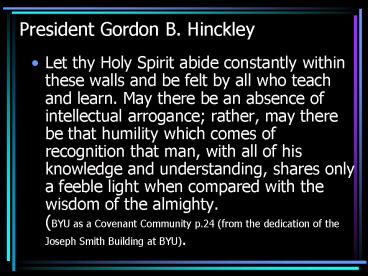President Gordon B. Hinckley - PowerPoint PPT Presentation
1 / 20
Title:
President Gordon B. Hinckley
Description:
Title: PowerPoint Presentation Author: firestonel Last modified by: firestonel Created Date: 1/8/2002 6:42:59 PM Document presentation format: On-screen Show – PowerPoint PPT presentation
Number of Views:78
Avg rating:3.0/5.0
Title: President Gordon B. Hinckley
1
President Gordon B. Hinckley
- Let thy Holy Spirit abide constantly within these
walls and be felt by all who teach and learn. May
there be an absence of intellectual arrogance
rather, may there be that humility which comes of
recognition that man, with all of his knowledge
and understanding, shares only a feeble light
when compared with the wisdom of the almighty.
(BYU as a Covenant Community p.24 (from the
dedication of the Joseph Smith Building at BYU).
2
God created the world, and my faith does not
hinge on the detailed procedures he used
Henry Eyring The Faith of a Scientist.
3
And behold, all things have their likeness, and
all things are created and made to bear record of
me, both things which are temporal, and things
which are spiritual things which are in the
heavens above, and things which are on the earth,
and things which are in the earth, and things
which are under the earth, both above and
beneath all things bear record of me.
Moses 663
4
(No Transcript)
5
(No Transcript)
6
(No Transcript)
7
(No Transcript)
8
The Cell
Allows continued Existence of
Energy utilizations
Leads to unity of
Cellular Reproduction
Evolution
Leads to common Processes in
Occurs through processes of
Metabolism
Explains relationships
Critical interrelationships in
Critical relationships Found in
Ecology
9
Setting some terminology straight
10
HYPOTHESIS
- A tentative explanation of one or more phenomena
in nature that can be tested by observations,
experiments, or both. In order to be considered
scientific, a hypothesis must be falsifiable,
which means that it can be proven to be
incorrect.
11
Fact
- A natural phenomenon repeatedly confirmed by
observation.
12
Law
- A description of how a natural phenomenon or
relationship will consistently occur under a
given set of circumstances.
13
Theory
- A well-substantiated explanation of some aspect
of the natural world that typically incorporates
many confirmed observations, laws, and
successfully verified hypotheses. - The theory of evolution is a collection of
explanatory concepts which seek to make sense of
the accumulated knowledge about the relationships
between living things and how organisms have
originated. Theories allow us to predict what we
may expect to see in new investigations, in other
words theories give us a framework for doing new
and different investigations that may further
help to explain the given phenomena.
14
TRUTH
- A scientific statement is true if all attempts
to falsify it have failed. Truth in science is
not some final statement that is correct for all
time. It means true beyond all reasonable
doubt. John A. Moore (Science as a way of
knowing pg. 136. 1993 Harvard U. Press)
15
INDUCTION
- involves reaching a conclusion based on
observations, moving from the specific to the
general. This is the method of reasoning used by
Darwin to develop his theory of Natural Selection
16
DEDUCTION
- Involves drawing specific conclusions from some
larger assumptions (from general to specific).
The formulation of a prediction based on a
hypothesis is an example of deductive reasoning.
When new data are added in support of the theory
of evolution, they are often the result of
looking for specific results we would expect to
see based on the theory which is already in
place In other words what the theory would
predict we might see.
17
Science as a way of Knowing
- Science is empirical (based on observation and
experimentation) - Data collected from experimentation must be
reproducible. - Many different groups of scientists can do the
same experiments and get the same results. - Experimental design must be falsifiable.
18
Religion as a way of knowing
- Based on faith, feelings and subjective
experiences - Not based on visual senses
- One persons experience cannot be replicated
exactly by another - Knowledge is gained by individuals as a sum total
of that individuals experiences and study
19
These differences could lead to a potential
conflict between science and religion.
- There is value and need for both ways of
knowing. It is important not to be closed
minded or dogmatic in either direction. Just
because they are different does not make one way
of knowing more important or more correct than
the other.
20
Discussion
- Evolution packet defined
- BYU Evolution packet
- A Lester Allen
- Kenneth J. Brown































